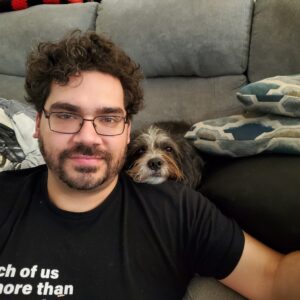Students of ACS
If you would like to be featured as a Student of ACS, complete the submission form.
April 15, 2024
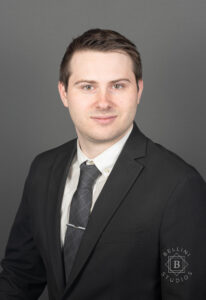
Marc Gull (He/Him), University at Buffalo School of Law '25
I am an enthusiastic advocate of constitutional law, driven by a lasting sense of justice. Growing up in Long Island, a region that suffered from historical redlining, shaped my interest in this field. This motivated me to pursue an extensive study of constitutional law at Buffalo Law School, where I took every constitutional law course available. I started my involvement with the American Constitution Society for Law and Policy (ACS) in my first year. I was immediately drawn to our chapter’s debates on state power and John Hart Ely’s theories of Rights. The networking events organized by our chapter helped me form strong professional connections with guest speakers, who became trusted mentors that have supported me throughout my law school experience.
Outside the classroom, I read the works of distinguished legal scholars such as Erwin Chemerinsky and Geoffrey Stone, as suggested by my professors. These readings not only enhanced my knowledge of the core principles of constitutional law, but also gave me perspectives on how the doctrines have changed over time. When I had the chance, I joined the school’s civil rights clinic. This enabled me to work on impact litigation cases aimed at reversing the harmful effects of disparate impact discrimination. I had the honor of leading a team on an amicus brief for an appellate case in the Third Department of New York. I am hopeful that our work will establish an important precedent for future fair housing cases. My journey is a steadfast quest for justice and equality, powered by a dedication to using the law as a means for positive change. This journey would not have been feasible without the assistance and influence of the ACS.
February 12, 2024
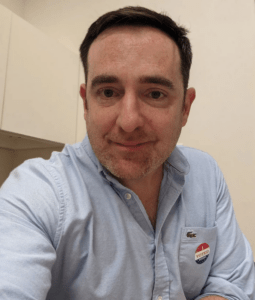
Johnny Epstein (he/him), Belmont University College of Law ‘24
Johnny is a 3L at Belmont and is thrilled to serve as the ACS chapter president. He believes in taking deep dives into un-white-washed, accurate American history to provide stronger context to black-letter laws that are covered in the law school curriculum.
He supports the argument that law should be used to empower and protect working class movements, strikes, and boycotts that historically are not given enough credit for advances in American society. This year, the Belmont Chapter focused on this theme by bringing in speakers with expertise in related areas: Prof. Garrett Epps (the myth of “colorblindness” in the 14th Amendment), Prof. Richard Rothstein (stains of government-mandated residential segregation), Andrew Cheatham (the future of the international peace process), Prof. Dana Frank (the lopsided fruits of New Deal), and so many more.
The chapter has also formed alliances across the law school by co-hosting karaoke and happy hour events with partner organizations: Belmont Outlaw, Belmont Women’s Legal Society, and Belmont Black Law Students Association. He believes that ACS can grow and strengthen by acting as a power hub for other law school organizations to build relationships and explore shared interests.
Most importantly, he argues that ACS should strive to win over hearts, minds, and stomachs by serving the freshest food made with love from local immigrant-owned Nashville restaurants. ACS Belmont aims to shock and awe its attendees by providing the best banh mi, tacos, burritos, and Thai food that the city has to offer.
During the summers he interned at Resilience Force, based in New Orleans, and Tennessee Justice for our Neighbors, based in Nashville. Prior to law school, Johnny worked as a licensed structural engineer and in green building compliance in the building industry.
November 27, 2023
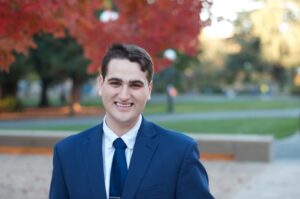
David Jaffe (He/Him), Stanford Law School '25
David Jaffe is a 2L at Stanford Law School, where he is Co-President of the ACS Stanford Law School Student Chapter. This year, the chapter has held fantastic events with federal judges on the Ninth Circuit and experts on reparations, tech regulation, and the Supreme Court.
Interested in a broad range of legal and policy issues, David has spent his time in law school exploring the many ways lawyers can effect progressive change in our society. He is an extern for the U.S. Trade Representative at the White House and is a leader in Stanford's Workers' Rights Clinic. He is also a law clerk for Will Bucher, the attorney bringing the largest consumer mass arbitration in history against Valve Corporation for violating state and federal antitrust laws. David spent the past summer working on civil litigation with the Navy Judge Advocate General's Corps and Capitol Siege cases with the United States Attorney for the District of Columbia.
Before law school, David worked in progressive politics in his home state of Arizona and for Skikos LLP, representing survivors of wildfires caused by PG&E. David holds a Master's degree from the University of Cambridge in Politics & International Studies and a Bachelor's degree from Stanford University in East Asian Studies.
Check out our Students of ACS feature, which runs weekly throughout the academic year. If you are interested in sharing your story with the ACS network, please send your blurb and a headshot to campus@acslaw.org. You can also nominate an ACS Student Leader for Students of ACS. Please share your nomination to campus@acslaw.org. And please do not hesitate to reach out if you have any questions.
November 20, 2023
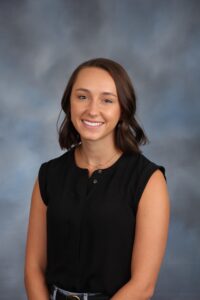
Ashley Good (She/Her), Vanderbilt University Law School '25
Ashley Good is a 2L at Vanderbilt University Law School and serves as the President of Vanderbilt’s ACS chapter. Ashley is focused on growing the progressive legal community at Vanderbilt and in the Nashville community more broadly. The chapter’s main event this semester was hosting Judge Theodore D. Chuang from the District of Maryland to speak on his career in public service and approach to his role in the judiciary. Looking forward, the chapter is excited to bring Donald Sherman from CREW to discuss Supreme Court ethics, host an event on clerkship applications, and discuss the future of affirmative action. Ashley has worked to grow student-to-student advice events such as on legal writing and the note writing process.
Ashley is involved in the social justice community at Vanderbilt outside of ACS as well. She is President of Vanderbilt’s Law Students for Social Justice organization and is writing about restorative justice for the Vanderbilt Journal of Transnational Law.
This past summer, Ashley interned at the Federal Public Defender’s Office in Nashville, TN. She is planning to work in a public defender office again this coming summer. Ashley will be clerking for Judge Douglas R. Cole in the Southern District of Ohio after graduation.
November 12, 2023
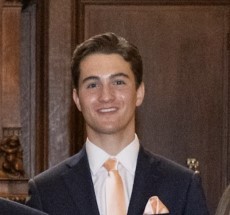
Luke Carroll (He/Him), Princeton University Class of '26
Luke is the founder of Princeton University’s undergraduate chapter of the American Constitution Society, which can be found at progressivelaw.princeton.edu. He is a student of Public Policy.
Luke founded the first undergraduate chapter of ACS in February of 2023. It has since hosted more than 20 public lectures and attracted more than 400 members. This year, the Princeton Progressive Law Society has invited guests ranging from Anthony Romero of the ACLU to Judge Carlton Reeves, the chair of the Sentencing Commission, and public intellectual Noam Chomsky. Luke is proudest of the club’s “Conversation with Law Students” in November 2023, which brought ACS law student officers from Boston College, Harvard, Yale, Columbia, and NYU to Princeton’s campus to engage with undergraduates and each other.
Luke has conducted research for various offices and institutes on Princeton’s campus. Most recently, he researched historical manipulation of the congressional rules of procedure at the election of a new Speaker of the House. He is currently involved in researching the growing third-party litigation funding industry and the effects of non-recourse loans on plaintiff settlement behavior.
In his free time, Luke is a proud member of the Club Hockey and Club Squash teams, in addition to studying foreign policy with the Liechtenstein Institute.
October 16, 2023
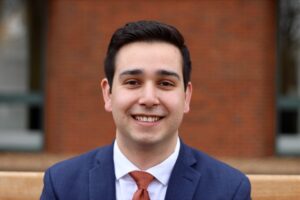
Anthony Valdez (He/Him), University of Virginia School of Law ‘25
Anthony Valdez is a 2L at the University of Virginia School of Law and serves as the President of UVA Law’s ACS Student Chapter. Anthony is dedicated to creating a robust progressive community at UVA Law and is actively growing UVA’s Student Chapter. This year, the chapter has planned events with Associate Attorney General Vanita Gupta and Congresswoman Jennifer McClellan, along with panels discussing issues like affirmative action, ICWA, and labor rights. Anthony has worked to strengthen the chapter’s progressive pipeline by helping plan events about clerkships, careers at Plaintiff-side law firms, and the 1L summer job search.
Outside of ACS, Anthony was a pro bono volunteer with the local Commonwealth’s Attorney’s Office as part of its reopened Unite the Right Rally investigation. His work helped the office bring felony charges against several white nationalist rally organizers. He is also a member of the Latin American Law Organization and is on the Editorial Board of the Virginia Law Review.
Before law school, Anthony was a staff member for the House Judiciary Committee, where he worked on both impeachments of President Trump, the Mueller Report hearings, and the Committee’s immigration portfolio. This past summer he interned at the Department of Justice Federal Programs Branch in Washington, DC. Next summer, he will join Kaplan Hecker & Fink in Washington, DC, as a summer associate. Anthony is planning to clerk after graduation.
October 9, 2023
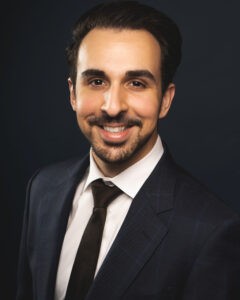
Antonio "Toni" Rodriguez (He/Him), Stetson University College of Law ‘25
Antonio "Toni" Rodriguez is a 2L at Stetson University College of Law and the Vice-President of its ACS Student Chapter. Born and raised in Miami, Florida, Toni is a second-generation Cuban American and first-generation law student who is deeply passionate about legal issues concerning voting rights, healthcare, immigration law, and civil rights. Before entering law school, Toni worked in politics and government, first as a campaign manager on multiple political campaigns and later served as Chief of Staff to a Florida State Senator.
Witnessing the growing impact the judicial system has on public policy, Toni decided the best way to advance public policy was to become a lawyer and help combat the rise of extremism. He joined ACS to help do his part as a law student in promoting progressive policies both on and off campus.
Toni spent his summer as a Legal Intern at the State Attorney's Office for Florida's 11th Judicial Circuit, working in the felony division. He also served as a Law Clerk for a local commercial litigation firm in Miami. After graduation, Toni hopes to work as a government attorney or for a nonprofit litigating legal issues that directly affect our civil liberties.
In his spare time, Toni enjoys running, kayaking, and watching a good political docufilm.
September 18, 2023

Kellie Lease Stecher (she/her), Northwestern Pritzker School of Law ‘24
Kellie is an award winning, board certified OBGYN. She is an author, women’s health advocate, and founder of an organization that helps healthcare workers struggling with burnout and mental health. She is a second year MSL student.
She decided to go back to school because Women’s health has also needed stronger and more educated leaders and advocates. She was accepted to the program prior to the Dobbs decision. However, this has made her, and many others, realize just how important a background in medicine is for politicians and lawyers.
She hopes she can use this unique educational background to help women around the country and create medically sound policy.
Her first book, Delivering, is a memoir. She wrote this book to help people struggling in the healthcare system, questioning their place in medicine, or working through abuse, assault, or losing a child, to not feel alone with their struggles.
September 11, 2023
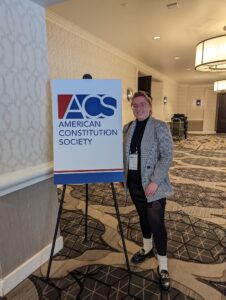
Alyssa Craze-Awbrey ’(she/her), University of Houston Law Center ‘24
Alyssa Craze-Awbrey is a 3L at the University of Houston Law Center, serving as the Vice President of the ACS UHLC's Student Chapter. Alyssa is never afraid to use her voice in the pursuit of justice and will never turn down the opportunity to help another. That could not be more evident than through her extensive activism on and off campus. Beyond serving as Vice President of the UHLC chapter, Alyssa is also the President of both the Association of Women in Law and If/When/How at UHLC.
She spent her summer working in the Felony Division of the Harris County Public Defender's Office. After graduation, she aspires to return to the Harris County Public Defender's Office and be an advocate for her community. Alyssa finds ACS particularly valuable to her law school community because it is a common ground for many progressive causes, introducing students to a wide range of contemporary issues while fostering a welcoming space on campus. Outside of law school, Alyssa also has started own photography business. When not behind a camera or textbook, Alyssa can often be found watching anime and spending time with her pets.
April 12, 2023
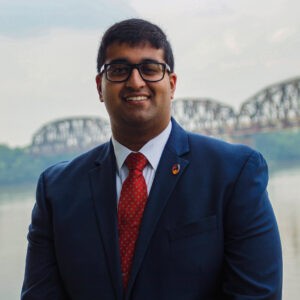
Joey Vettiankal (he/him) Vanderbilt Law School ‘24
As the son of immigrants in rural Kentucky, my first exposure to the legal profession was not from anyone I knew but from my love of comic books and the Marvel Comics character, Daredevil. Inspired by Daredevil to personally live out these values, my own life experience, education, and community involvement quickly demonstrated to me the reality of constant inequality and hardships faced by the marginalized in our communities. When many of our country’s leaders focused on building walls to divide us, I wanted to be one to build bridges so that everyone had a seat at the decision-making table. I wanted to dedicate my life to being an advocate for others through the law as the first in my family to go to law school.
My time at Vanderbilt Law School has allowed me to work in a collegial environment with the incredible leaders both in and outside of ACS at the law school. My immediate involvement with ACS during my 1L year gave me a community of support and friends who shared the same values of inclusivity, accessibility, and justice as me. After my first year, I knew that I wanted to serve as President of the Vanderbilt chapter to ensure future students would have an even stronger community that I did when I began law school. I am proud of our chapter’s work to put on numerous, quality events spanning a wide variety of issues like voting rights, reproductive rights, and court reform as well as our chapter tripling its membership since the start of the year. My time with the Vanderbilt ACS chapter has allowed me to develop my leadership skills and be a part of a larger coalition of progressive students at the law school.
ACS has also shown me that folks with my background or those who look like me can be the oral advocates arguing before our nation’s highest courts as litigators. My involvement with ACS has allowed me to live out my personal values of advocating for others and lifting up marginalized voices. This organization also showed me my passion for both written and oral advocacy.
To me, being a leader means being involved in the betterment of my community both in and out of the courtroom. As a future attorney, ACS has enabled me to continue to live my values and lay a foundation for a successful career centered in advocacy.
March 12, 2023
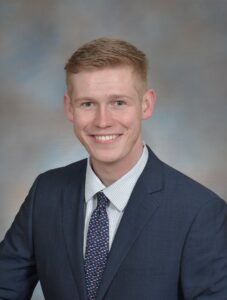
February 12, 2023
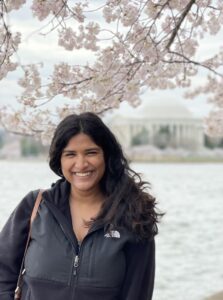
Lavanya Prabhakar (she/her/hers) Northwestern Pritzker School of Law ‘24
It took me a while to realize I wanted to be a lawyer. With so few legal role models in my life, my path towards law school was only clear to me when I got involved in campaign politics for the very first time.
When I graduated college, I got my first job as a tracker on a political campaign. Every day, I drove across the state of New Hampshire, attending town halls, campaign events, and rallies to get footage of Republican candidates, mainly listening to conservative stump speeches railing against democratic norms and progressive policies. As a tracker, my job was to stand back and film. I felt powerless listening to truly dangerous campaign platforms and not being able to advocate for the marginalized communities who would suffer as a result of those policies. At the same time, the state legislature was making it harder to vote, particularly for students. Without a law degree, I felt helpless as I saw people lose their ability to voice their opinions at the polls. However, I was truly so inspired by the voter protection lawyers I met who went to court and fought for the student vote. From then, I recognized the power of legal advocates and resolved to go to law school to learn how to advocate for fair voting rights for all.
I joined ACS because I didn’t want to stop advocating for progressive policies just because I was a student. Through my time at Northwestern, our ACS chapter has put on events that have touched issues close to my heart, like voting rights and gun safety, bringing advocates on campus to help inspire students to use their voices and take action Our chapter has brought judges on campus to network with students and we have created a tight-knit community of progressive students who have been able to lean on each other to get through the hardest parts of law school. I am so excited to see how our ACS chapter grows and makes sure that law students have a voice in advocating for what they believe is right.
I’m so excited to keep going on my path to being a voting rights advocate and I can’t wait to get back to politics and campaigns with my new ACS network.
January 23, 2023
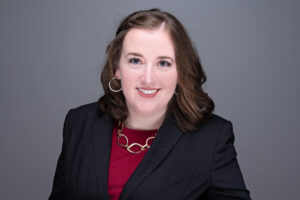
Farrah Alexander (she/her) University of Louisville Brandeis School of Law '24
As a writer, author, and activist, I became inspired by attorneys who so often were thrown into first responder roles defending the rights of those in need. I found the law as an effective and direct way to enact positive change so I pursued law school. In my first year at IU McKinney, I won the Indianapolis Bar Association’s inaugural writing competition with an essay proposing a three-point legislative plan to combat the state’s maternal mortality rate. I am thrilled to be continuing my legal education at the University of Louisville Brandeis and to serve as the ACS President. I’m really looking forward to mobilizing progressive law students to turn their passion into action and make a positive impact in the legal community through ACS.
My debut book, RAISING THE RESISTANCE: A Mother's Guide to Practical Activism was published by Mango Media in 2020. My latest book, RESISTANCE IN THE BLUEGRASS: Empowering the Commonwealth was published by the University of Kentucky Press in 2022 and featured a foreword by Rep. Attica Scott. My editorial work has been featured in Huffington Post, BUST, and Scary Mommy. My commentary (i.e. ridiculous tweets) have been discussed in Scientific American, Buzzfeed, Refinery 29, Yahoo, Hello Giggles, Woke Sloth, Cosmopolitan, Elle, Perez Hilton, Daily Mail, BBC, and others.
I’m a member of the Everytown Author's Council, which was designed to "harness the power of the literary community to amplify the gun safety movement." As a Jew, the principle of tikkun olam—or the repair of the world—is a guiding force in my life. I currently served on the Jewish Community Relations Council in Louisville. I previously served as a Jeremiah Fellow with Bend the Arc: A Jewish Partnership for Justice along with a cohort of young, progressive Jews dedicated to fighting white supremacy, antisemitism, and injustice.
I live right outside Louisville, Ky. with my husband, son, and daughter. I love to visit state and national parks with my family, mentally unload with reality TV, and am motivated by bending the arc of justice just a little further every day.
January 12, 2023
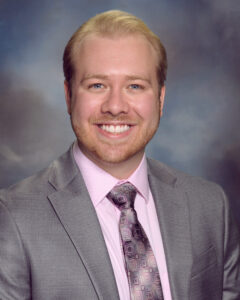
Travis J. Hunsberger (He/Him), Syracuse University College of Law ‘24
To be an American today is to participate in the greatest experiment of human history. This experiment, almost 250 years old, tests the resolve of a free people to forge a more perfect union. A union bounded by equality, tolerance, and liberty. While our country has not always lived up to its ideals, nevertheless, America remains the only nation, which has since its beginning, declared that we can do better.
As the only child of a mechanic and a nurse, I was always raised with the belief that any problem can be solved with hard work, planning, and vision. As President of Syracuse University College of Law’s ACS Chapter, our team has moved beyond platitudes to provide practical civic leadership experience to the next generation of America’s leaders. Whether our members end up in private practice or the public sphere, we believe that the opportunity to study law is a rare privilege. With privilege, however, comes responsibility, and regardless of where our members end up after law school, we all bear responsibility for the future of American freedom. At a time when the American Dream is seemingly locked behind a paywall, our members are fighting every day to ensure that we leave our country and communities better off than how we found them.
When I finish law school, I look forward to returning to my native Pennsylvania, where I hope to work in government one day, bettering the lives of my fellow Pennsylvanians. Working with the American Constitution Society has reaffirmed my public service commitment and strengthened my resolve. The skills I have learned from ACS will last a lifetime and will undoubtedly help me as I move forward in life and in my career. I am immensely grateful for the time working with the American Constitution Society, and I hope that every law student who cares about the future of American democracy gets to experience the opportunities ACS provides its members.
October 03, 2022
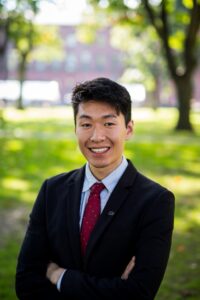
OLIVER MA (HE/HIM), HARVARD LAW SCHOOL '23
Oliver is a 3L at Harvard Law School, serving as co-president of Harvard ACS. He loves working with people, organizing, and challenging authority. He came to law school to learn how to use the law to advocate for marginalized communities, but is leaving law school without faith that the legal system is a system for justice. Organizing progressive students through ACS has been Oliver's favorite part of law school, and he plans to continue the same after law school. In his spare time, Oliver enjoys playing water polo, making delicious stews, and rooting for progressive governments worldwide.
September 26, 2022
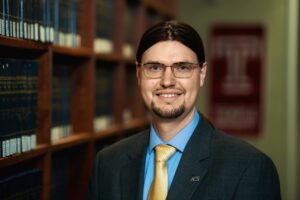
ARLO BLAISUS (HE/HIM), TEMPLE UNIVERSITY BEASLEY SCHOOL OF LAW ‘24
I came to law school because of a court case, Miller v. Thurston. Arkansas, like states across the country, is blatantly gerrymandered, The citizens of Arkansas petitioned for a ballot initiative to change the state constitution to create a non-partisan redistricting panel so they could choose their representatives, not the other way around. Unfortunately, the ballot measure was struck down by the state’s conservative Supreme Court on the narrowest grounds. This was when I realized the power of the legal profession.
Another time, this might not have been enough to push me to a career change, but this was 2020. The political violence that would eventually erupt on January 6th was already evident. Trucks flying Trump flags tried to run a Biden campaign bus off the road in Texas. Armed militias gathered at courthouses. As early as August 2020, Trump stated “the only way we’re going to lose this election is if the election is rigged.”
I could no longer ignore the fact that Democracy itself was under assault. I decided to be a lawyer. I came to law school to defend our democratic institutions, and I joined the American Constitution Society because they were already in the fight.
In America, we are very comfortable speaking of our rights but we must also recognize the duties inextricably linked with those rights. I believe that every citizen has a duty to support democracy, not merely participate in it. ACS gave me the tools and connections I needed to fulfill that duty.
I spent my first year at Temple University Beasley School of Law running an Election Day Class Cancellation campaign as an ACS 1L representative. Now — for the first time — every law student at Temple has the day off on Election Day to vote, volunteer, and engage in democracy. This year I am the President of Temple’s ACS student chapter, and we are organizing student volunteer efforts on Election Day. I am proud to be making a positive contribution, and I know ACS will be with me every step of the way.
September 19, 2022
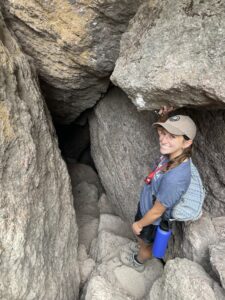
EMMA GÓMEZ (SHE/HER/HERS), UC BERKELEY SCHOOL OF LAW ‘24
Becoming a lawyer was not the career I always saw for myself. Growing up as a Guatemalan American in rural North Carolina, I always knew that I wanted to “make a difference” but wasn’t sure how. I grew up integrated with the problems of the U.S. immigration system after witnessing family members and friends struggle with obtaining protection after following all of the “rules.” At the same time, I also grew deeply concerned with the changing climate after growing up on the Outer Banks of North Carolina. There are so many issues that need attention. As I became more aware of the world, I began seeing how so many of these issues stem from the injustices and inequalities of our legal system. It led me to law school.
I have ACS to thank for guiding me to the place I am today. After graduating college with a degree in Political Science, I joined the pipeline of young graduates heading to find work in Washington, D.C. Lucky for me, the job I was fortunate to receive was a fellowship at ACS.
Working at ACS for two years exposed me to the magnitude of opportunities that a law school graduate can take with their degree. Lawyers can not only work in private practice, but also be judges, policy makers, attorneys general, and nonprofit leaders. Not only did I gain insight into all the different career paths I could take, but I gained tremendous mentors from supervisors. Supervisors who will call their friends to help me learn about a position, text me to ask about my summer job plans, or call me to get their nails done together when they plan to be in town.
As I reflect on my time at ACS and my first year of law school, I find myself reflecting on how embedded the issues of systemic racism and inequality are within our legal system. For example, the Constitution was created when slavery was legal, yet we are nonetheless forced to accept it as canon that is important and just. Furthermore, when asked for the holding or takeaway of a given case, the answers are often rooted in decades of disappointing precedent that leaves me frustrated about how real change can occur in a true democratic society. In reflecting on these issues, I am reminded that I am fortunate to be a part of an organization that focuses attention on what the law should be. I’m excited about the upcoming year of Berkeley Law ACS with my Co-President Alison Luna and look forward to staying involved with ACS throughout my career.
May 2, 2022
Nicholas Ramirez (he/him), University at Buffalo School of Law ‘22
I have wanted to be a lawyer since first grade when I read a Thurgood Marshall quote in a comic book. Ever since, I have wanted to work to help people.
Since joining ACS during my 1L year at the University at Buffalo School of Law I have worked to diversify our membership and make our resources available to first-generation students. As a 2L, I orchestrated our first event at the end of the summer to talk about the state of civil rights today. This year, I organized our first event as a Supreme Court preview to make incoming students aware of what we could expect. My final event in my role as Diversity Chair and Vice President was a panel discussing the lack of diversity in the appellate bar. I was proud to see so many people from underrepresented groups take an interest and reach out to us after. The fact that this event occurred as another organization was hosting a racist event on campus not too far away, made me even prouder of our turnout and efforts.
Having grown up mixed race and poor in one of the most segregated cities in the country, I knew I wanted to do something to help people who couldn’t afford an advocate. After graduating, I will be at the Legal Aid Bureau of Buffalo in their Criminal Defense Unit. I look forward to carrying the same commitment and passion I have had for ACS during law school into the ACS Western New York Lawyer Chapter.
If you would like to be featured as a Student of ACS, complete the submission form here.
March 7, 2022
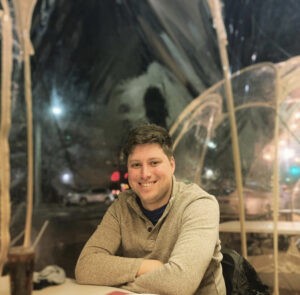
Harris D. Bresowsky (he/him), Albany Law School ‘22
“You take the baton from the ones who've come before, and you carry it as far as you can” This quote is from the movie, “Barry” and it captures my ambitions as a lawyer. I grew up in Brooklyn, NY as a son of an immigrant, who left the former Soviet Union to come here, a country with unlimited promise. But throughout the years, I’ve come to understand that this promise is not so unlimited for everyone. Through advocacy and campaign work, I’ve come to understand the various challenges that different communities face and I can confidently say that I’ve certainly grown as a person along the way.
My journey to law school wasn’t always so clear-cut – there were many challenges along the way. There were moments of adversity, and there were moments of triumph. When I first got to college, I took a few political science classes and instantly knew that I wanted to work in politics and advocacy. I eventually became more involved on campus and, as a result, became more interested in representing people and their interests. I knew that I needed to go to law school in order to truly make a difference, so I applied.
My first year of law school was one of my biggest periods of adversity up to this point and there were many times where I felt as if I didn’t belong. I’ve always been fairly confident in my schoolwork, but something about law school was different – I was off of my game. I felt that everyone was smarter than me, everyone was more well-connected than I was, and everyone just seemed to get it. Law school was soup, and I was a fork. No matter what I did, I always seemed to fail. It was around the time that I joined ACS in my second semester, that everything finally started to come together. Law school suddenly wasn’t as scary as the first Civil Pro class – it started to click.
Joining ACS was one of my proudest moments in law school. Our Chapter had just been established and I had an opportunity to share ACS’s message at my law school. I eventually became my Chapter’s Co-Chair and we were instrumental in organizing school-wide events, with the help of our great ACS national staff, such as Chris Lin and Peggy Li (along with countless others). We’ve hosted events with the highest judges in the State of New York and with some of the most recognizable faculty members. I enjoyed being Co-Chair so much that I ran again for a second year. I am so proud of the work that our Chapter has done here at Albany Law and will continue to do after I graduate.
As for my future, I hope to work in public service after I graduate and serve as an advocate for the people. Civil service caught my eye when I first started college and continues to be my passion. And I’ll always carry that baton for advocacy and justice as far as I can.
February 28, 2022
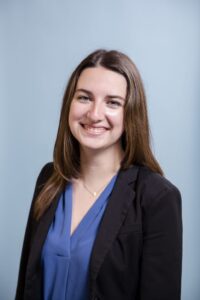
Jennifer Sherman (she/her), Berkeley Law '22
Even before deciding that I wanted to apply to law school, I knew ACS was the home for progressive lawyers and law students. I was working in government affairs in DC and had the opportunity to attend a few in-person ACS National events. Learning more about our court system and the different ways policy and law interact at these events influenced my decision to go to law school.
I chose to attend Berkeley Law based on its commitment to public interest and public service work, making sure that the law is used to serve and improve our communities. Being a part of ACS further enhanced these values for me. Joining ACS gave me a community of law students who were interested in a broad variety of progressive values at the intersection of law and policy. I was able to be a general board member during 1L, Vice-President as a 2L, and now Co-President. I’m really proud of the variety of topics we have had book talks, speakers, and panels on, both in-person and online. It takes an entire board to do this, and I am especially grateful to them and my Co-President, Jean Larsen, for being so amazing.
As I prepare to graduate and hopefully begin my career as a public interest attorney, I know that I will still have that ACS community there to support me. I look forward to the challenges progressives may face over the next several years and hopefully view them as opportunities to change the law and legal system for the better.
February 21, 2022
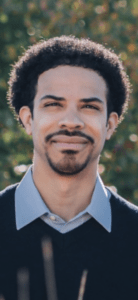
Shawn Deadwiler (He/Him), UDC David A. Clarke School of Law '24
I am honored and thankful to receive this recognition from the American Constitution Society.
My diverse upbringing, along with my athletic, academic, and professional background has given me the determination to overcome any obstacle, to endure any adversity, and to adapt to changing environments.
Diversity embodies who I am. The son of an African American service-disabled veteran and Hispanic/Caucasian health worker--my father and mother. In my youth, I was fortunate to have grown up in Ramstein, Germany, not long after the fall of the Berlin Wall; Woodbridge, Virginia; and Phoenix, Arizona. As a kid, living within different cultures and demographics fostered in me a deep interest in history and how it shapes our future. Two decades later, after witnessing the struggles my father encountered as an African American and learning the history of America's systemic inequality, I am motivated and determined to make an impact.
The more we understand the history of concepts like the "state action doctrine" and the "standard of the reasonable prudent person," the more transparent ploys emboldened by bad faith of some people with political, judicial, and other power become.
The intersection of history and law is where I have found my passion. It seems right that Constitutional Law would become my favorite course, and the American Constitution Society my extra-curricular home.
February 14, 2022
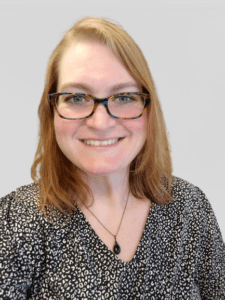
Christina Hough (She/Her), University of San Diego School of Law ‘25
I decided I wanted to be a lawyer when I was 13 years old after having personal experience with the legal system a few years prior. When I was 10 years old, I had my first exposure to the legal system when I was represented by minor’s counsel in a custody dispute. My lawyer, Serena, was so kind and thoughtful in her approach, and looking back now I truly appreciate her manner, poise, and restraint in deciding whether or not to present very adult issues to a child. This, in part, solidified my desire to pursue a career in law.
I have been working as a legal paraprofessional for the better part of 20 years but finally decided to take the leap and apply to law school this past summer. I am very interested in a number of practice areas and hope my law school experience helps me to focus those interests. Specifically, I am interested in high-stakes civil litigation, intellectual property litigation, special education, and sports and entertainment. I also plan to dedicate a significant number of hours to pro bono causes.
I am a firm believer that each one of us can improve society by pitching in. Public service is near and dear to my heart and it is incumbent upon us to contribute our time and talents to improve the lives of those around us. Whether it be volunteering at a soup kitchen, picking up trash, or simply reaching out to our neighbors to ensure they are okay, we can make a positive impact in the world and enrich our communities for the greater good.
My personal experiences have made me a firm believer in the U.S. Constitution and our justice system. While not without flaws, they are a reminder that great minds can do great things when they work together and brainstorm to solve pressing issues. ACS helps to remind us of that. I have attended several virtual ACS events over the last year or so and I find the content interesting and enriching. It is a great organization that I hope continues to grow and expand its reach. I look forward to getting more involved in my local student chapter as I progress in my law school career.
February 7, 2022
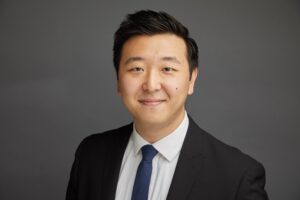
Calvin Reeh (He/Him), Columbia Law School '23
My law school experience so far has impressed on me the importance of the law—it influences and regulates our politics, our culture, our government, our livelihoods, and our access to justice. Those who create, interpret, and apply the law have the awesome responsibility of making sure it is done in a way that is fair, just, efficient, and effective. But they are people just as much as the rest of us, coming to their jobs with their individual ideological and political beliefs about what the law is or what it should be. I've seen these realities first-hand in my internship at a federal district court, in discussing the merits of different legal rules with some of the most notable legal scholars in the country, and in the conversations I have with my incredibly impressive classmates and fellow ACS members.
Before law school, I studied theology as a graduate student overseas, and worked as a field organizer in the 2020 democratic presidential primary. My experiences motivated me to understand the mechanisms of power in our country and help those who don't have access to them. I joined ACS because I want to use my legal career to ensure that the law is aligned with progressive values, that people are treated equally irrespective of their religion, race, gender, or sexual orientation, that all citizens have access to fair and free elections, and that the law does not favor the wealthy at the expense of everyone else. My time with ACS at Columbia so far has been rich in meeting like-minded peers, having the opportunity to have difficult conversations about the law with our law school community, and hearing from professors, judges, and legislators who have been in the trenches of law-making and interpretation for most of their careers.
January 31, 2022
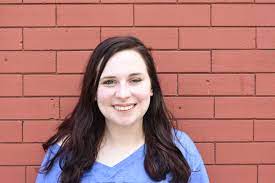
Angela Peterson (She/Her), University of Chicago School of Law ‘23
This year, I’ll be living in my sixth state in as many years. I like to think this near-constant change of scenery stems from living in the same blue house on the outskirts of Chicagoland until I graduated high school. While the buildings I live in now tend to be less colorful physically, my towns have often been portrayed through shades of red and blue. These include, in popular terminology, a dark blue mark in a contentious purple state, a purple city in a sea of red, and even a small blue community within a swath of red that borders one of the bluest parts of the country.
Yet once I lived in each of these communities, I found there was absolutely no way to reduce them to blues, reds, and purples. While things certainly felt different when I took the lightrail to work instead of walking on broken or simply unbuilt sidewalks, or when I was able to call the city’s civil engineering to retrieve my phone from the gutter instead of depending on a volunteer fire department for practically all emergency services, each place felt in tune with the American spirit.
Living in these communities helped me to fall more in love with our federal system and to recognize ways in which our local governments may implement policies to best serve the community. Such a spirit cannot be achieved, however, without bringing everyone to the table. I’ve made it my goal to carve out as much of a path to make channels of change accessible in whatever small ways I can. For example, I strove to drive up recruitment at my independent student newspaper to give every interested student a clear opportunity to contribute their voice to the campus and city discourse. As Co-President of the University of Chicago Chapter of the American Constitution Society, I hope to do my part in not only making the organization comfortable for students no matter what walk of life they may come from, but also foster an environment where everyone can bring their own ideas and experiences to the table as we strive to make our communities, cities, and nation “of the people, by the people, and for the people.”
January 24, 2022
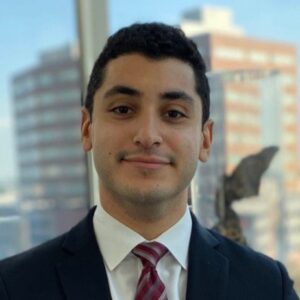
Giancarlo Piccinini (He/Him), Seton Hall University School of Law ’22
I happen to be attending law school at a time where it seems law and policy have never been more divergent. For this, I consider myself lucky, not only because I am the first in my family to do so, but also because I see a real opportunity to move the conversation forward in my lifetime.
In this regard, I find Justice Brandeis’ theory of “full discussion” especially impactful. He wrote, concurring in Whitney v. California (1927), that “public discussion is a political duty[,]” and “that this should be a fundamental principle of the American government.”
As ACS President at Seton Hall Law, I made a point to organize dynamic panel discussions because I wanted to engage both members and nonmembers around topics of common concern. We did so by selecting event topics and curating questions and content that would foster dialogue among both panelists and attendees.
While I personally moderated our events, several hands played a part in their development and execution. We also supplemented events with intermittent topic-driven forums dedicated to open dialogue to engage members and nonmembers.
We are, after all, a national organization dedicated to realizing the promises of the U.S. Constitution. If we are to advance and defend democracy in this way, then we have a duty to foster and develop full discussion.
This means engaging ideas among and between our members, as well as those of others because when we meaningfully engage ideas adverse to our own, we gain an opportunity “to expose through discussion the falsehoods and fallacies” potentially occasioned by those ideas.
But this approach is concededly unpopular. An increasing number of those whose ideas differ remain divided wherever they draw the line. Some have become less considerate, while others are more intolerant. But we are more deliberate, more accepting, and more open-minded than that.
As an organization, we remain on the forefront of upholding the Constitution in the 21st century by continuing to share our voices and shape the debate. We do this when we engage both our own, as well as the ideas of our day, “with confidence in the power of free and fearless reasoning.”
Growing up in a working class, first-generation household, I developed a unique respect for shared responsibility. To this day, I believe we each have a role to play. If we are to inspire the next generation of progressive lawyers to use the law to secure a government that serves the public interest, then each of us has a duty to critically engage and drive that conversation—not only for ourselves, but also for our future.
January 17, 2022
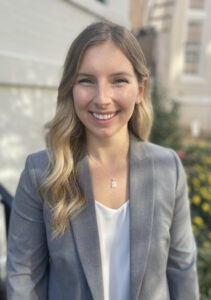
Abbie Hibsch (She/Her), Wake Forest University School of Law '22
As an undergraduate intern at my local hospital, I walked into the long-term care unit on a chilly fall day, excited to see my patients. I was a nerdy psychology student, marching through the halls, sporting a pair of glasses that made me feel smart. I was on my way to an informal therapy session with a patient who had recently become paralyzed. It was an incredibly humbling experience to be trusted with this patient's most harrowing mental struggles.
On this day, not long after our session began, my patient revealed that she was severely mistreated by the hospital staff--both physically and mentally. This denial of care was detrimental to her already-diminished health. As an intern with a flimsy paper name tag, I spent the entire afternoon frantically chasing down the correct personnel to ensure her proper care. Many providers refused because my patient was sometimes verbally unruly--but can you blame her? She just became paralyzed! Eventually, I found a nurse who was willing to help, and my patient received the care she desperately needed.
I knew there was much more work to be done. How could I be certain she'd be protected the next day? Or next month, when my internship ends? How many other disabled individuals are also being mistreated and going unheard? Over the next several weeks, I couldn't stop thinking about this patient and others like her. There had to be a better way to help.
I never intended to go to law school; I always felt drawn to the "helping professions" like nursing, counseling, or social work. However, my experience made me realize that legal work is a "helping profession" too. I came to law school to help individuals like my patient. I hope to make a significant change in this area of law, both by preventing abuse and by seeking redress for those who have already fallen victim to it.
The ACS community has been the most incredible platform to advocate for disadvantaged populations of all kinds. It's been an honor to work alongside such brilliant, like-minded students, and I am grateful for the opportunity to stay involved with ACS throughout my career.
December 6, 2021
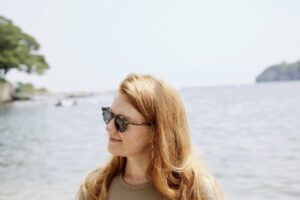
Sarah Chase (she/her), Northwestern Pritzker School of Law '23
The first job I distinctly remember wanting was that of a lawyer. In elementary school, I was infatuated with the idea of building cases, arguing in court, and fighting for something I believed in. By the time I understood how most lawyers spend their time, the prospect seemed less appealing. Instead, I thought could try to be an oncologist, or if I was lucky, an editor at Rolling Stone (who doesn’t want to write about music and politics?).
But as I became more aware of the world, I saw more clearly how many issues seemed to stem from the law. I watched punitive laws push people struggling with addiction into the criminal legal system. I saw the Ohio legislature strip unions of their collective bargaining rights. Following the financial crisis, I recognized the effects of laws favoring big banks as factories closed and foreclosures spread.
While starting to understand how much harm was rooted in the law, I also came to appreciate how powerful a tool the law could be. After the Affordable Care Act stopped insurers from denying coverage to people with pre-existing conditions, my family was able to purchase health care for the first time since my mom had become disabled a decade earlier. In 2013, organizers in my hometown of Dayton, OH used civil rights laws to force a predominantly white suburb to allow construction of bus stops connecting mostly non-white riders to its affluent shopping mall. Though the organizers pushed for change using a variety of tactics, navigating the law was a key tool at their disposal as they forced the city to comply with Title VI.
I came to law school recognizing that the law is not the answer to inequity. Nonetheless, it is a tool we can use to effect change. At Northwestern, ACS gives students a platform to highlight not just how law shapes our communities but also how the law can be used to improve the practical realities of people who are dispossessed and disenfranchised and further justice for all.
November 29, 2021
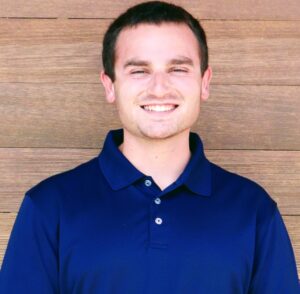
Brandon Raynes (he/him), University of South Dakota Knudson School of Law ‘23
Martin Luther King Jr. once said that “injustice anywhere is a threat to justice everywhere.” I went to law school because I recognized that our nation is in critical need of advocates to give a voice to the voiceless and to represent the underrepresented. I recognized that our system of “Equal Justice Under Law” could not be safeguarded without fighting the inequalities present within our society attacking its integrity. I recognized that MLK Jr.’s vision of a land where all men were truly created equal was in danger. As a result, I saw a calling for myself: to stand up and vigorously defend true and universal justice for all.
Originally, I wanted to serve in the military in the footsteps of my grandfather who, coming from a family of immigrants fleeing Europe during the rise of antisemitism, chose to give back to a country that, for once, gave himself and his family a chance to live peacefully, prosperously, and happily. However, I knew deep down that I had the heart of an advocate who not only wanted to help those who were in my grandfather’s family’s shoes, but also wanted to help all those whose voices were being muted, lost, or ignored within our democratic institutions. So, then came law school, where my desire to become an advocate of justice has only grown stronger each and every day.
In this current academic year, I am the President of our law school’s American Constitution Society Chapter. My overall hope with running the Chapter is to foster awareness, civil discourse, and a productive environment where constructive ideas about bolstering social justice and equal opportunity can turn into meaningful action.
November 22, 2021
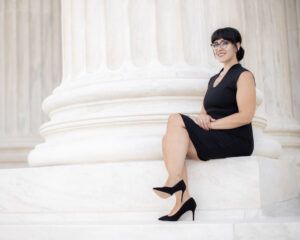
Sierra Kennedy (she/her) American University Washington College of Law ‘23
Being raised in the heart of Appalachia, my view of the world was closed off and narrow; molded by generations of undereducation and lack of diversity. At 18, I left Appalachia for the first time and moved to Tucson, Arizona for college, the place I consider home to this day. There, my understanding of the world was challenged and I began creating my own ideals of the world around me. I strayed from the safety of my closed universe and surrounded myself in hardships and injustices. The more I learned, the more my view of my future changed. Eventually, I was in my advisor's office changing my major. I added time to my schooling, and debt to my name, but I knew where I needed to be: fighting every injustice I came across. Focusing on domestic human rights and civil rights gave me the broadest scope to help the most people and I have not looked back since.
Life didn't go quite as expected. I finished my undergrad, completed my graduate degree, and soon found myself as a single mother of three after fleeing an abusive relationship. At one point I was homeless and working four jobs while saving every penny I could to take the LSAT.
Now, I’m here—a 2L evening student in one of the top evening programs in the country. My days start at 4:30 a.m. and end at 11 p.m. As a first-generation student, I had so much to learn. In law school, I looked for student groups that shared my passion for justice and viewed themselves as the people who would stop at nothing less. I found ACS and the rest is history.
This year, I’m the President of the American University Washington College of Law’s ACS Chapter. It has been slow-moving this fall due to my own mental health struggles, but my board and I are currently working to make up for it and more in the Spring. I was just welcomed into the Truth, Racial Healing, and Transformation ACS Student Task Force and together we hope to bring a voice to those so often silenced among us in our communities. I am working closely with my colleagues and professors to bring a Truth Commission to AUWCL to ensure everyone has a chance to speak out against injustices in a space where they can feel safe and heard so we can begin to ensure no one ever feels the way they have felt again.
With the camaraderie I have experienced thus far through my involvement with ACS, I know the future is no longer bleak. I know these injustices most accept as “just the way it is” will soon be only taught in history books. For that, I am grateful for stumbling upon ACS and the amazing people I have met so far.
November 15, 2021
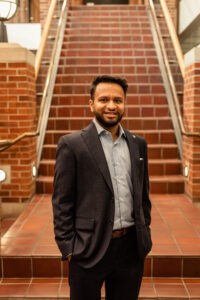
Hirsh M. Joshi (He/Him), University of Missouri School of Law ‘23
I came to law school with the intent to put my zealousness to good use. During the beginning of my law school career, I saw the strength of our democracy tested. I saw attacks on our electoral process. I saw physical attacks on our Nation’s Capital. I saw lawyers threatening protestors with guns then launching campaigns for the U.S. Senate. I saw some of the worst of humanity during my 1L year; and some of the worst of the legal profession. It's pretty easy to get discouraged when you see someone in your future profession do terrible things.
On the contrary, those events inspired me to become involved in Mizzou Law's ACS Chapter. ACS was the perfect place for me to build community and gain skills to become a better attorney. As the current president, I encourage my Chapter to plan programming that demonstrates how to not just become good lawyers but to be lawyers for good. Our Chapter has started a series titled Equity Under the Law which we hope to use to give a platform to underrepresented communities and the policies that affect them.
During my 1L year, my Torts and Criminal Law professor said something that continues to inspire me; while reflecting on a case, he spoke about "the disconnect between the law and reality." My Chapter’s goal through programming is to make that disconnect obvious, and my personal goal in my career is to get rid of that disconnect. Maybe then, I will consider my zealousness to be of good use.
November 8, 2021
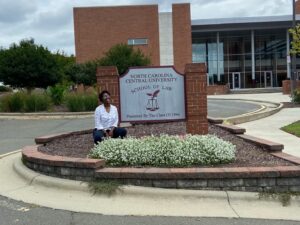
Toni Stone (she/her), North Carolina Central University School of Law '23
As my mom always says, "You can't do anything by yourself." The community I had before ACS and since ACS helped me to achieve my wildest dream. I have wanted to be a lawyer since I was five years old and would argue with my aunt all the time. I graduated undergrad in 2017 and took some time off to work, but I always had that nagging feeling to go to law school. I had put my dreams on hold, and it was time to get back to them.
I was in the process of looking for a new job when my high school guidance counselor, Sharon, emailed me about an opportunity in D.C. Even though I had graduated almost six years before, she always checked in with me. She told me to look into an organization named the American Constitution Society. They were hiring fellows and she thought it would be perfect for me. I set out that week to research ACS. I read their mission and values and knew it was something I wanted to be a part of. Soon after, I sent in my resume and cover letter. About a month later, I heard back that I was chosen for an interview. Once again, I fell back on the people who had supported me until this point. Sharon and my other high school teachers helped prepare me for the interview. At the time, I was living in New York and decided I would take a bus down to D.C. on the day of my interview, but Sharon would not hear of it. She knew my clothes would be wrinkled, and I would be too tired. Instead, she bought me a train ticket. Two weeks after my interview, ACS called me and offered me the position of Student Chapters Fellow. I stood on the train platform crying because I knew I was that much closer to my dream of becoming a lawyer.
Through ACS I gained a mentor in Peggy Li, who stayed up with me late into the night reading over my personal statement and law school applications. Peggy always reminded me--and still does--of the power I hold. Meghan Paulas encouraged me to participate in more activities and I took the opportunity to attend the Black Pre-Law Conference and Law Fair. At the conference, I decided I wanted to go to an HBCU law school. Molly, Jordan, and Michelle grounded me by continuously checking in when things became too overwhelming. Through ACS I met Dean Dawson which confirmed for me that North Carolina Central University School of Law would be the best place for me. I wouldn't have gotten to where I am without the help, love, and compassion of the folks who believed in me. I am forever grateful to the folks I met at ACS and ACS.
November 1, 2021
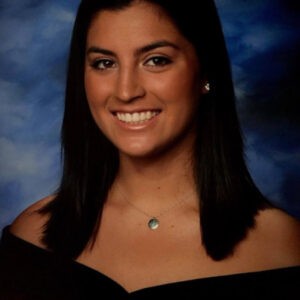
Julia Rose Aguilera (she/her), Southern Sierra Miwuk, University of Arizona James E. Rogers College of Law ‘23
My desire to study law has been fueled intensely by my lived experiences as a Native American woman and my aspiration to seek reparations for my people through federal recognition. The American Constitution Society has provided me with the platform to advocate for tribal sovereignty and address current social and legal issues that are the legacy of American colonialism. As a future public interest lawyer, I want to ensure that the most marginalized communities, such as my own Southern Sierra Miwuk Nation, have the information and resources to exercise their democratic rights. I want to advocate for reduced racial and economic disparities by instituting and promoting job training programs, educational opportunities, and health services for those most in need.
I feel strongly about systemic inequalities that disproportionately affect people of color and lower-income communities. I hope to promote job training programs, scholarship funds, and health services to begin addressing the economic disparities found in so many tribal communities. I want to advocate for economic development by ensuring that tribes receive proper funding. In many cases, federal recognition is the first step in eligibility for government assistance. I also want to increase protection of tribal lands and resources through unwavering stewardship and community outreach, combining traditional knowledge with modern technologies.
I am drawn to public interest work because of my parents' careers and because of my desire to give back to my community in Oakland (and other communities like it). My parents worked for labor unions and instilled collective action values in me early on: Use your voice for the greater good and do the right thing. The Black Lives Matter (BLM) movement was my introduction to using my voice for a greater purpose - just like my parents on the picket line. I learned more about social movements from volunteering at BLM services and attending rallies, LGBTQ+ protests in San Francisco, and Women's Marches, all of which inspired me to study law and seek a career in public interest law and policy.
I was nominated and twice elected to serve as the President of the revived Arizona Law student chapter of ACS. As ACS President, I have advocated for progressive ideals with a focus on threats to American democracy, including voter suppression efforts such as various programming events and initiatives including a conversation with Gabriela Cázares-Kelly, the first indigenous woman to hold elected office in Pima County.
For me, being a part of ACS is not only a great way to engage with bright law students across the nation, but it is also an opportunity to connect with my ancestors in a way I never have before. Historically, the law has been a force for keeping my ancestors in poverty while robbing them of everything they've ever known. The opportunities I have today were unimaginable for even my grandparents. Because of that, I have a responsibility to harness the power of advocacy and advance the causes they were never able to. Indigenous pride and sovereignty are at the core of my identity, and I want to use my legal training to uplift my communities as we reclaim our culture.
I hope to continue to combine the determination and desire for social justice that my parents taught me with the values of ACS. Doing so will aid me in my goal of serving the public interest, especially among those whose voices and traditions have been marginalized.
October 25, 2021
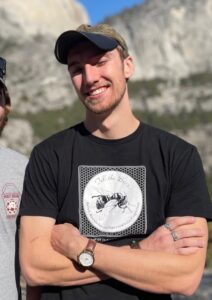
Harley Phleger (He/Him), Pepperdine Caruso School of Law ‘23
At 11:50 a.m. on March 12, 1892, my great-great grandfather, Charles Wilhelm Phleger, was shot to death in a saloon in Sacramento. This is why I'm in law school.
Charles was not a lawyer. He was a farmer from Ohio, then a railroad worker, and eventually a cowboy and prominent ranch superintendent in California's Central Valley. The man who shot him, Hiram Palmer, worked closely with Charles for many years. But when Charles served as a key witness against Hiram in a series of lawsuits which left the latter destitute, Hiram spiraled into alcoholism, eventually ending in the aforementioned murder. The subsequent trials made national headlines and became something of a regional cause célèbre. Witnesses went missing, fights broke out in the courtroom, and there were even two incidents involving vigilante mobs. But once the dust had settled, Hiram was left with a reduced charge of manslaughter (thanks to some brilliant and ferocious attorneys), got shipped off to San Quentin, and all was forgotten. The four children Charles left behind never spoke of the day, and Mary, his widow, didn't either. For more than a century, our family knew none of what I have just told you. But in the spring of 2019, something changed.
I had been talking with my father about some of the old family gossip, and that evening engaged in a curious Google search. The terms "Charles Phleger" and "murder" returned astonishing results. By May, I had amassed more than 229 newspaper articles, news-clippings, and photographs. I collected everything from birthdates, maps, and ranch inventories to specific dollar amounts, middle names, and attorneys' credentials. I found out which direction Charles was facing (northwest) when the shots began, in what sequence they were fired (rapidly, from a distance of two or three feet, the third missing and hitting the wall), and at what angle each bullet made contact with the body. And, in particular, I became utterly absorbed in the legal minutiae--the objections and affidavits, the bails, arraignments, and judges' names--and followed the court proceedings from case to case, arrest to sentencing. The endeavor resulted in a 20-page timeline, a nearly 13,000-word narrative summary, and, most importantly, a fascination with the process of the law.
I did not intend to become fascinated. In fact, for much of my life, I intended to avoid the law. My attraction seemed more the result of gravity than personal ambition. But gravitate I have, and since that discovery, I have only fallen deeper into legal orbit. I am now a 2L at Pepperdine, and the President of our ACS chapter, with particular interests in public defense and indigent legal aid. Law was not my great-great grandfather's life--but it was, in the end, what was left of it. Where the inertia of that legacy will eventually lead me is unclear. But this is where I'm coming from.
October 18, 2021
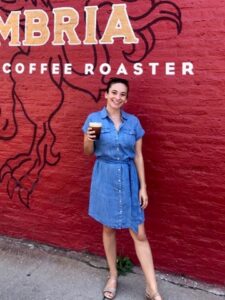
Kenna Titus (She/Her), The University of Texas School of Law ‘23
I have always felt passionate about civil rights. My first exposure to activism was participating in the 2011 Wisconsin protests against the newly passed anti-collective bargaining bill. I spent weeks protesting at the state capital in the hopes that our politicians would listen to the popular will. I found it infuriating that the peoples’ voices could be ignored because the system was rigged through gerrymandering and disenfranchisement. At fourteen, I saw the harm that unjust policies could have.
After college, I moved to Austin, Texas and took a job at the Texas State Legislature. I watched firsthand as the Texas House passed bills defunding abortion providers, allowing businesses to discriminate against LGBT+ people, and further eroding local control of finances.
By this point, I knew I had to spend my career trying to stem the tide of harmful policies, and to help good ones make their way into law. I enrolled at the University of Texas Law School with the intention of going into civil rights policy work. In my time at UT, I have met an incredible community of like-minded, progressive law students.
This year, I serve as the Co-President of the UT Law Chapter of ACS. ACS has provided students like me the opportunity to formalize our commitment to progressive legal work. We have held events including one for Constitution Day, in which Professor Steve Vladeck discussed the recent changes to Texas abortion law and the Supreme Court’s shadow docket. We’ve also hosted an event about the state of labor and unions during Covid-19, and we are co-hosting an “alternative curriculum” series with Law Students for Black Lives to discuss important legal topics that don’t show up in the classroom.
ACS has been an important anchor in my law school experience, helping me build community with like-minded students. I hope to be a part of the progressive movement in this country, pushing just policy and fighting to improve people’s lives. That work starts at law school, inspiring in others a drive for equity and justice that they will carry into their future careers.
October 11, 2021
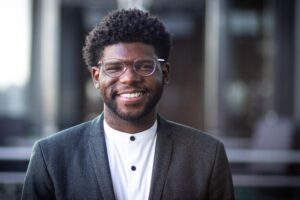
Jaylin D. McClinton (He/Him), Chicago-Kent College of Law '22
Each day, I wake up in my childhood home in Chicago's Roseland neighborhood, a 93% Black community with a $37,242 median income on the South Side -- a community plagued with high unemployment, a lack of economic development, and limited educational opportunities.
In 2009, Roseland garnered national headlines for the brutal beating of Fenger HS honors student Derrion Albert. Derrion's death was a clarion call to action for community leaders, law enforcement, and policy makers to address the ongoing crisis of youth violence in Chicago. Like many young African-American men across the country, Derrion's story resonated with me for a number of reasons. Indeed, his short life represented yet another "dream deferred" for Black men within my community. This experience, and others alike, has fueled my pursuit of higher education, passion for social justice advocacy, career aspirations as a public servant, and my intent to use the rule of law as a means to fundamentally change the material conditions of those populations historically underrepresented and often misrepresented in society.
As a child, I traveled up to an hour and a half outside of my community to attend elementary school and high school, which I always thought was odd, but my mother and grandmother, two phenomenal Black women, wanted to ensure that I gained opportunities that they had only dreamed of. As a result, I attended Saint Sabina Academy, Curie Metropolitan High School, and the University of Illinois at Urbana-Champaign. Now as a law student, I realize that I was -- and still am -- a first-hand witness to the inequities present most notably in communities of color.
Further, as an active student leader of color for the American Constitution Society, I work tirelessly to live out the belief that the United States Constitution is, "of the people, by the people, and for the people." In fact, for everyone reading this, I want to empower you now. I want to challenge you all to get involved in the electoral process whether that means joining a campaign, voting on Election Day, serving as an election judge, doing election protection work, or running for office yourself. Authentic community organizing and engagement is the true way to promote equal opportunity for all.
In closing, I look forward to remaining involved for years to come and living out these words from the late Justice Thurgood Marshall, my personal hero, "Where you see wrong or inequality or injustice, speak out, because this is your country. This is your democracy. Make it. Protect it. Pass it on."
October 4, 2021
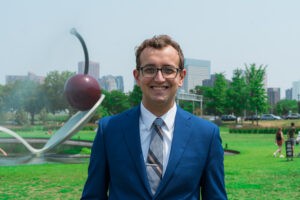
Jacob Skold (he/him), University of Iowa College of Law ‘23
I’ve wanted to practice criminal law in the public sector ever since I shadowed in juvenile court as part of an assignment in 9th grade. For years I was extremely noncommittal about which side of the “v.” I eventually wanted to land on. The considerations for making that decision always revolved around me: Which would be a better fit for my personality? My work style? My personal life?
A major life event forced me to radically reshape my frame of thought and put me firmly on the path to becoming a public defender. After living in a small-town setting for my whole life, I moved to Minneapolis for my first post-grad job. Less than six months later, I experienced my first seizure and was subsequently diagnosed with epilepsy. Epilepsy is a unique condition to live with in that most of the time it has almost no impact on your life, but every so often you have a bad day and suddenly you can’t do simple things like drive your car for a span of several months. Living in a big metro area, this meant that I had to become a lot more reliant on public infrastructure, rideshares, or the goodwill of a friend for transportation. This cost me a lot in terms of time, money, privacy, and independence. Suddenly the suburbs became unreachable, and housing options were limited. Grocery stores and shopping malls were less accessible. Medical appointments. Municipal offices. The list goes on.
Though these obstacles are temporary for me, my condition has made me much more aware of the systemic barriers that others less privileged than me face every day, and I feel duty-bound to call attention to these barriers. Someone’s life, through no fault of their own, can change drastically for the worse in the blink of an eye, and they might need the compassion and help of the state to get the resources they need to return to stability. I aspire to be a public defender so that I can go to work every day and advocate for these people.
I greatly value the work that ACS members are doing to drive progress within and without the criminal legal system. Fred Rogers taught us all the importance of looking for the helpers, but I feel it’s just as important to look for opportunities to be a helper. I am extremely grateful that this organization provides these in spades.
September 27, 2021
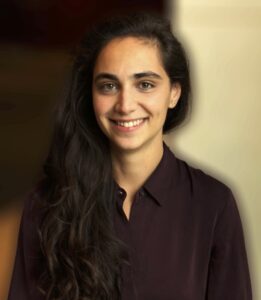
Eliane Bejjani (She/Her), Georgetown University Law Center '22
My path to law school was guided by the profound appreciation for institutions, the rule of law, and deliberate social contracting that my multicultural childhood instilled in me. Growing up, I was fascinated with the root causes of the differences in daily life between New York and my father's home country of Lebanon. To better understand how polities are shaped and maintained, I studied politics as an undergraduate in the United Kingdom; I then supported public sector projects as a management consultant in the United Arab Emirates and Saudi Arabia. Across these experiences, I built an appreciation for the law as a tool through which to make aspirations and abstractions a reality.
Once at Georgetown Law, ACS helped me feel at home after nearly eight years abroad. In the organization, I found a diverse group of people passionate about a broad range of issues. Their common interest in progressivism was one I could identify with and share, even if we didn't share the specific interests of governance and corruption. I felt this elusive, thrilling sense of belonging most acutely during the first ACS event I led, a comparative constitutional law conversation with Georgetown's Professor Yvonne Tew and former Lebanese presidential candidate Chibli Mallat. ACS had room for me, while also providing the structure, programming, and network through which I could learn and grow as an advocate, legal thinker, and leader.
I'm thrilled and honored to lead Georgetown's ACS chapter this year with my co-president, Victoria Sheber. Two thirds of the way into law school, I admit an enduring frustration with the presentation of the law as a sterile intellectual universe removed from the very real outcomes it triggers. Instead, our chapter hopes to highlight the choices inherent in legal decisions and the corresponding responsibilities -- and opportunities -- facing our profession. Our goal is to challenge existing paradigms and encourage our peers to think about new ones. We plan to amplify community members through allyship and collaboration, so that the outcomes we discuss are inclusive, creative, and forward-looking. As our Georgetown motto goes, Law is but the means, Justice is the end. I'm humbled at the opportunity to contribute what I can, and eager to work with the ACs network in the future.
September 20, 2021
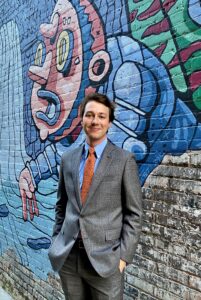
Elisha M. Untiedt (he/him), The University of Memphis Cecil C. Humphreys School of Law ‘22
On January 6th of 2021, I was watching the events of the Insurrection unfold as I sat at my kitchen table trying to focus on my second semester of online classes, which suddenly seemed so secondary. In that moment, I knew I needed to be more involved in the progressive policy movement in any way I could. It was then that I found ACS. Memphis Law’s fledgling chapter had been hurt by the move to online education, holding few events and not having a presence or much engagement with the student body.
I knew this had to change. I immediately went to work to recruit new members and get a streamlined contact service for members. We were able to double our membership, elect a new and more diverse executive board, and get much greater engagement with the student body. I was inspired by students who, like myself, were not even part of the prior executive board, but stepped up to help the chapter grow and change. Ultimately, I was elected President for the 2021-2022 school year.
By revitalizing ACS at Memphis Law, we have given progressive students a stronger voice and unwavering representation on campus. Thanks to our location in Memphis, we also have an abundance of progressive policymakers and leaders in the city who have been excellent resources to our chapter as event speakers and guides, showing us how we can grow and make a positive impact on our community. In a state such as Tennessee, there are opportunities abound to fight for progressive law and policy. We are using our growing platform to speak out on topics affecting our neighbors and peers, including Tennessee’s version of Texas’s anti-choice bill, anti-LGBTQ legislation, and oil pipelines that seek to destroy historic communities of color.
We’re also seeking to educate our student body and city about the challenges to progress in Tennessee, including the importance of state and federal courts, the judicial nominations and appointments process, and the impact of bias and impartiality, including in relation to a new state court panel that was recently created in Memphis to hear a number of state constitutional challenges and challenges to the state redistricting process. It may be an understatement to say our hands are full here in Tennessee, but I am proud of our chapter and excited to see how we can aid in the fight ahead!
September 6,2021
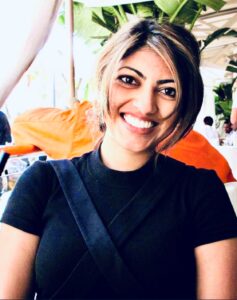
Chandni Challa (she/her/hers), Saint Louis University School of Law ‘22
It was not my first choice to come to law school. Honestly, it was neither my second nor third. I graduated from the University of Virginia with a degree in economics and politics with a minor in public health and, instead of going to law school like the rest of my family, headed to Chicago to work as a government healthcare consultant. Throughout my consulting career, I worked with Health and Human Services agencies in Illinois, New York, Texas, Louisiana, Alabama, and North Carolina, analyzing their business processes and reengineering their internal structure for greater efficiency and productivity—and I fully intended to continue.
However, years of contending with both the complex American bureaucracy and the idiosyncratic administrative law system became incredibly frustrating. One incident with a benefits specialist in Alabama was particularly disheartening. The specialist explained the agency’s quota system that required specialists to turnaround a certain number of Medicaid, Medicare, and Veterans Administration (VA) applications within a specific time period. If an individual specialist did not meet the quota, they would be reprimanded. Specialists who were reprimanded more than once were let go. In order for this specialist to meet her quota and keep her job, she would take stacks of applications, put them in her desk drawer, and throw them in the dumpster hoping the individuals would re-apply. This was the only way she felt she could meet the quota. I was heartbroken not only for the people whose applications were never evaluated, but for the country at large. At that moment, I knew that unless policies were changed, my attempt at changing programs was for naught. I realized that while reengineering is a powerful tool, the law is more broad-reaching‒allowing an individual to effect meaningful change on both a small and large scale. Through consulting, I saw the law as a living, breathing entity not only worthy of study, but worthy of life-long dedication.
Fast forward to 2021 and I am currently a 3L law student at Saint Louis University studying health law. Upon graduation, I intend to continue fighting for progressive causes particularly with disenfranchised populations in the Virginia-D.C. area. Last summer I had the pleasure of working at Legal Services of Eastern Missouri where I helped individuals appeal their Medicaid benefit denials where loss of benefits were largely due to the negligence of the state adjudicators. By using my skills as a law student to aid elderly, homeless, and disabled individuals restore their health benefits I feel strongly that my decision to go to law school was the right one. This past summer I also served as a faculty fellow for Professor Ruqaiijah Yearby working with the Center for Disease Control on issues of federal and state pregnancy discrimination.
ACS is vital to ensuring meaningful societal change because the organization provides both an outlet for discussing progressive ideas, and a means to advocate for those ideas. I am honored to be an ACS chapter leader and Next Generation Leader and look forward to continuing my involvement well into my legal career.
I am an ACS Student Chapter President and an ACS Next Generation Leader, and have had the privilege of putting my lifelong dedication into practice by coordinating programs on the pervasiveness of structural racism in all aspects of society. I also plan on coordinating health law programs, as health law affects all other progressive causes such as lowering rising healthcare costs, decreasing high recidivism in prison, and managing food deserts in areas of extreme climate change and poverty. As a chapter leader, I aim to elicit a paradigm shift in legal application by demonstrating the power of interdisciplinary analysis.
8/30/2021
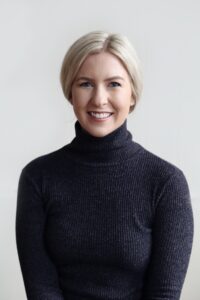
Natalie Kozel (she/her/hers), Creighton University School of Law '22
Law school is a transformative and unique experience all by itself, add in a worldwide pandemic, and students have had one of the most unique experiences possible.
My time as President of ACS at Creighton Law started in August of 2020 when the world was trying to figure out how best (or how at all) to conduct classes while protecting students and faculty. In the midst of this, ACS (and Zoom!) allowed my Chapter to put on some of the most dynamic, thought-provoking programming for Creighton Law students in the last decade. Our Chapter arranged: a Mayoral Candidate Forum for the entire City of Omaha (which included the most diverse group of candidates ever); had multiple conversations to honor and educate during Black History Month; and engaged Creighton alum--ranging from a former Obama White House staffer to a federal judge whose hardline stance against federal sentencing guidelines was taken up by the Supreme Court, where his decision to forego sentencing was ultimately upheld. We partnered with other clubs and organizations on campus, some of which had written off programming altogether due to COVID-19, and strengthened our collegial relationships by doing so.
The support I had from ACS National was incredible (shoutout to Jordan Blisk!). Our Chapter received encouragement every step along the way, which allowed me to navigate the complex year. I wholeheartedly and vigorously support the mission of ACS. The organization has cultivated a rich group of motivated and caring future attorneys who are not afraid to have difficult conversations and are eagerly pushing for change. Although my career goals have stayed rooted in private practice, I will without a doubt remain active and engaged with ACS and its mission in the private sector. I thank ACS for the opportunity to lead, to have the difficult conversations, to challenge the views of others, and to join such a dynamic and vitally important organization. I remain optimistic that the best is yet to come, both for ACS and for our country.
If you have a story you would like to share through Students of ACS, please e-mail us at campus@acslaw.org.

